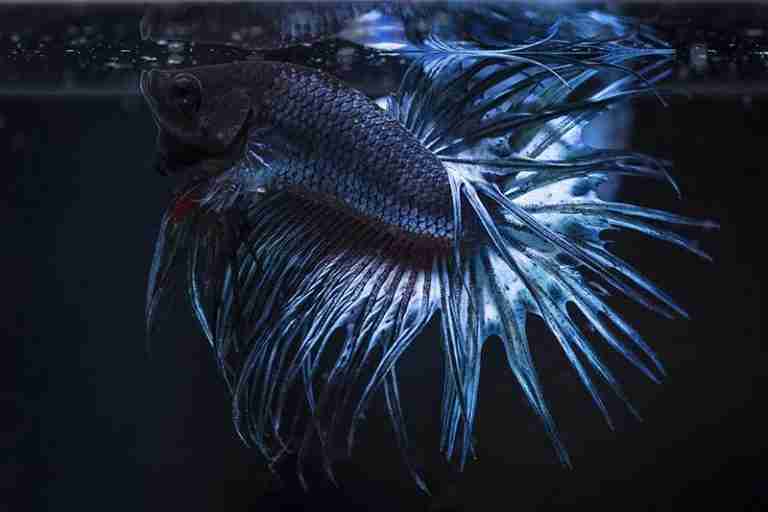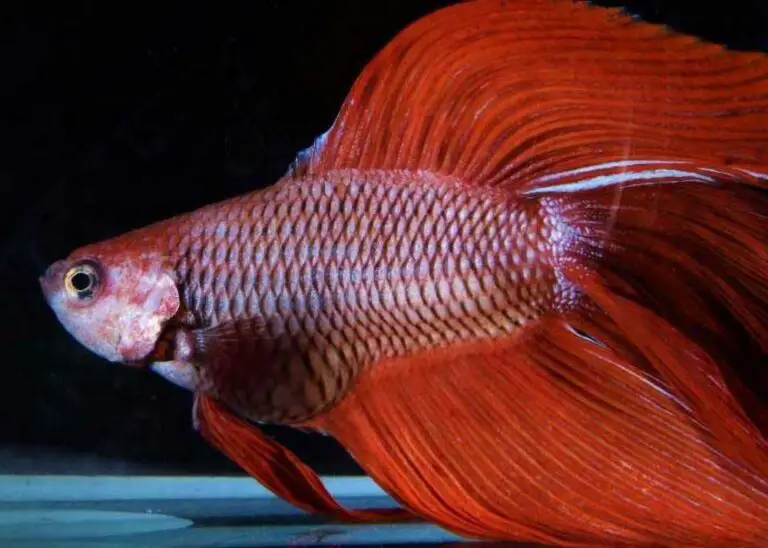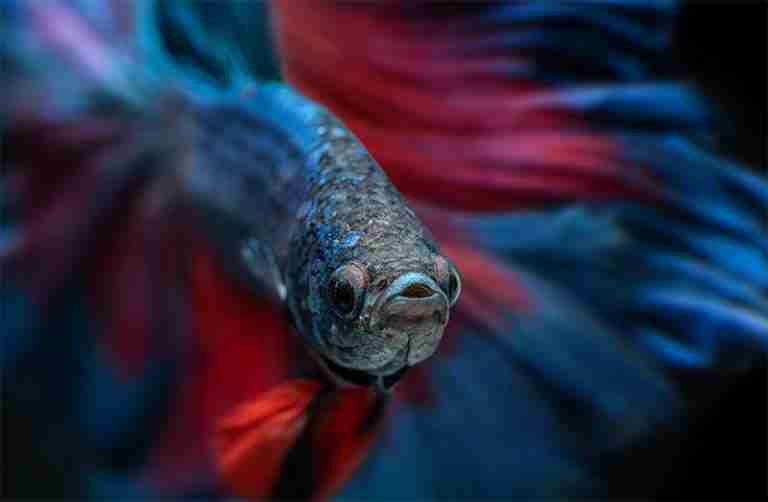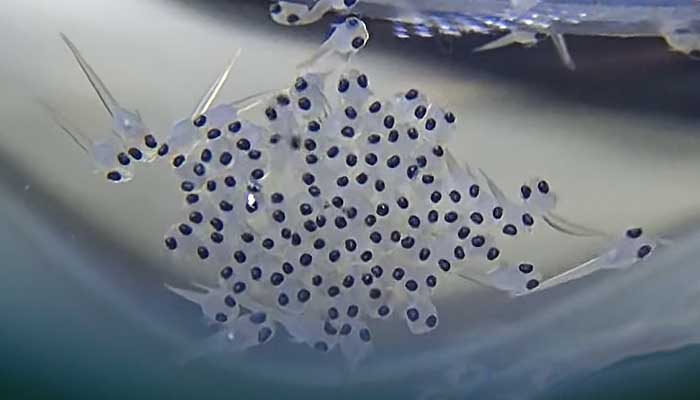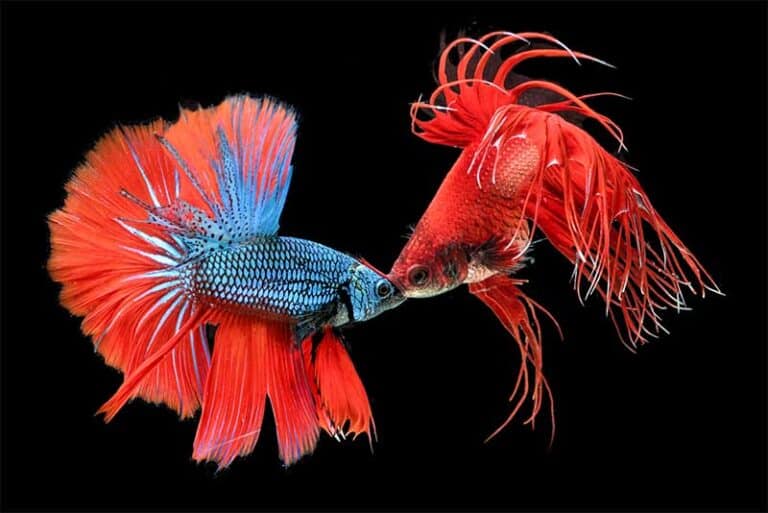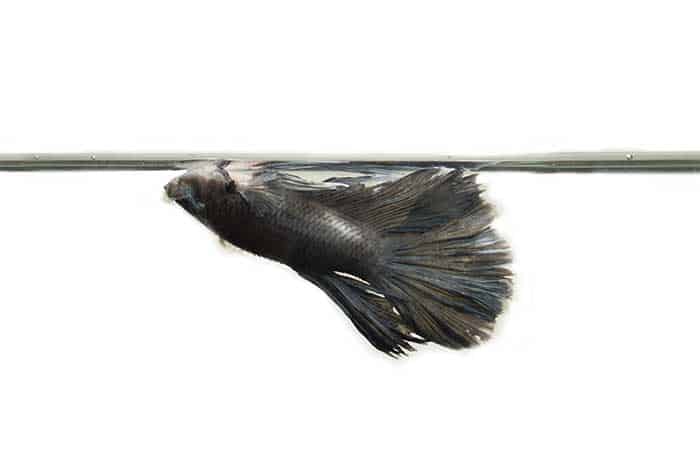Why Won’t My Betta Fish Eat? – 6 Possible Reasons Why
Why won’t my betta fish eat? It’s a common question, and it can be tricky to figure out the cause. It could be a change in your betta’s diet, or maybe your betta fish is feeling unwell. Betta fish stop eating for many reasons, some more serious than others but often easy to fix.
6 of the most common reasons why your betta may not want to eat are:
- Stress.
- Boring diet.
- Inadequate tank lighting.
- New tank syndrome.
- Sickness and disease.
- Environmental factors.
Betta fish are very sensitive to environmental factors and illnesses that can stop them from eating. Both factors can cause stress, putting your betta off their food. Ensure your betta’s tank is large enough, clean, well-lit, and away from loud, intrusive noises.
You should also look for signs of general illness or bullying from other fish.
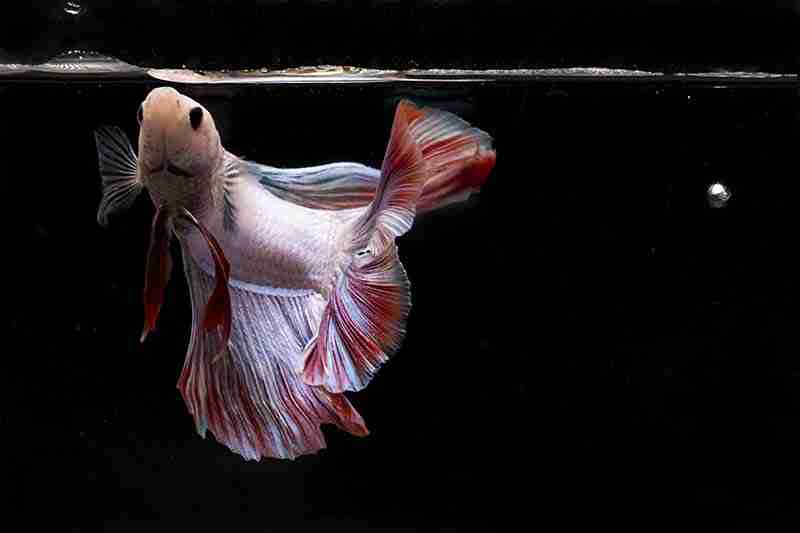
Because your betta cannot tell you what is wrong, figuring this out is a matter of trial and error.
In this article, I explain why each of the 6 reasons listed above can impact why your betta fish is not eating to help you narrow down the cause and find a suitable solution.
Make sure to check out our betta fish care guide.
1. Is Your Betta Fish Not Eating Due To Stress
Stress is often the cause when fish behavior changes suddenly. Fish often get stressed when they are moved to a new tank or when the activity in their environment increases.
Stress can also be caused by aggressive fish living nearby and even by loud noises (like the sound of your hairdryer). If you notice stress symptoms like fins clamped together with no movement, your betta fish may not eat for this reason.
In fact, stress can be a symptom of almost anything that makes your betta fish unhappy, and identifying stress is a great place to start when identifying a problem.
Betta stress stripes are dark horizontal lines that run along the length of a betta fish’s body. Stress stripes can appear quite suddenly and disappear just as quickly, but they are an easy way to spot the signs of stress in betta fish.
2. Is Your Betta’s Diet Affecting Them
Betta fish need to be fed a balanced diet to stay healthy. Bettas are carnivorous fish but will eat a varied diet, including plant matter (such as leafy vegetables) and animal meat/protein.

A bettas diet should consist of around 80% sinking pellets and 20% freeze-dried foods such as freeze-dried bloodworms or brine shrimp once or twice daily for adults, typically in the morning and evening after lights out since betta fish often are more active at this time.
Betta fish are picky eaters. If you are not feeding your betta fish the right type of food, it may starve and stress out even more! Be sure to research what types of food betta fish eat to keep them healthy and happy.
A poor diet with little variety can lead to constipation, causing your betta to feel full and bloated. If constipation is the cause, your betta will definitely not want to eat.
How often you feed your betta fish will vary depending on their environment, activity level, age, and general size, but routine and variety are key when feeding a betta fish.
A betta’s eating habits can vary, and a change in diet can cause a betta fish to stop eating from time to time, so you must always provide the right type of food! If your betta is a picky eater and there is less variety available, it may not want to eat.
Ensure you provide enough live and varied foods. It may be obvious to some, but simply switching to a different food may cause your betta to begin eating again.
Best Foods For Betta Fish
Below, I have provided links to some good betta foods available online.
The best live food for betta fish are:
- Bloodworms
- Blackworms
- Mosquito larvae -no more than one per week (Check Price On Amazon)
- Brine shrimp and daphnia (Check Price Of Live Daphnia On Amazon)
- Cut up pieces of earthworm or nightcrawler
- Freshwater Scuds (Gammarus Shrimp)
The best freeze-dried food or frozen foods for betta fish are:
- Freeze dried or frozen bloodworms (Check Price On Amazon)
- Freeze dried or frozen blackworms (Check Price On Amazon)
- Freeze dried or frozen brine shrimp (Check Price On Amazon)
- Earthworms (dusted with vitamin and calcium powder)
If you haven’t already, I highly recommend checking the variety of fish foods available at Chewy.com Shop Betta Fish Food & Supplies at Chewy!
All of the above betta food should be available at your local pet store or fish store, although live foods are sometimes more difficult to come by.
Betta pellets are also a staple food; make sure you always buy high-quality food, as cheap food may be putting your betta fish off eating.
Trying various foods may be all it takes to get your betta fish eating again, as they may just be holding out for better food!
One final consideration is, are you giving your betta too much food? Your betta may be too full to eat food.
3. Poor Quality Tank Lighting Can Stress Your Betta
If you provide the best possible food, but your bettas still lack appetite occasionally, it’s also important to look at your lighting situation in the tank! Lighting can have an effect on both stress and diet for many reasons (including seasonality).
All living things need light to survive, but bettas require special lighting. Betta fish require light that emits blue and red wavelengths to thrive.
The betta fish needs blue light to stimulate appetite and digestion and red light to perform necessary biological functions.
If your betta fish does not get the right light, it may stress them out and cause them to stop eating.
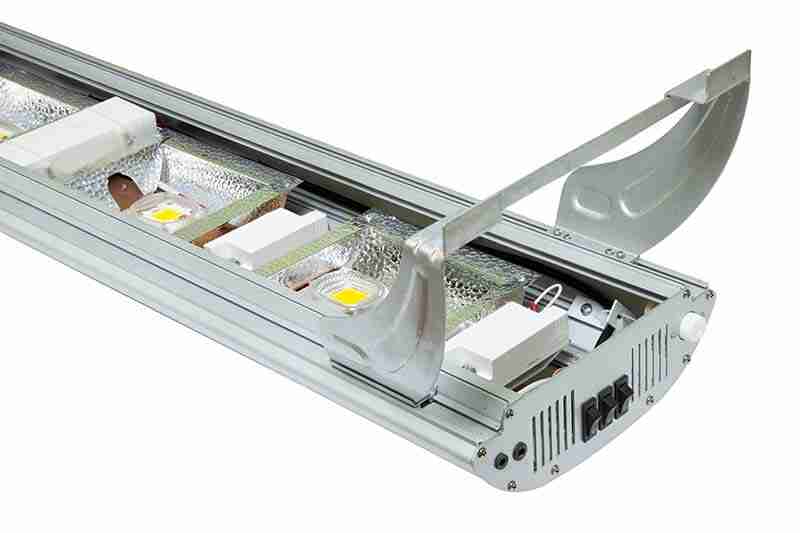
Try using a low-wattage LED tank light or even just an energy-efficient bulb at night, which should be dimmed to emit red wavelengths only during this time of day. For best results, you can purchase specific lights made for betta fish, whose needs differ from other fish.
4. Can New Tank Syndrome Cause My Betta To Stop Eating?
New tank syndrome occurs when a new environment does not have the correct water parameters for your betta fish. You may be caring for your betta, but why would they want to eat if the tank conditions are not right?
If you have a new betta fish, the stress of a new tank may cause your betta to stop eating. To stabilize the water parameters, you must wait at least two weeks before adding fish and plants into the tank. However, sometimes it takes longer than this for all factors in your aquarium environment (such as temperature) to be stable enough for any living thing to thrive.
Does your betta live in a community tank with other fish? Are the other aquarium fish eating well?
Is the new tank too small? Find out how big a betta tank should be.
5. Is Your Betta Sick? (A Symptom Is Not Eating)
Like many other species of tropical freshwater fish, Betta fish can become sick even with regular water changes. If you notice any of the following symptoms, your betta fish may be sick and not eating:
- Difficulty swimming or staying upright may indicate Swim bladder disease.
- Not being as active as it usually is.
- Cloudy eyes, betta fins clamped together with no movement, discoloration in color (usually white).
- Sunken eyes or abdomen, scales sticking out more than usual.
Betta fish get diseases easily, and stress is also a cause of lowered immunity to disease. If you notice these symptoms, your betta may be unwell! A betta fish not eating for 2 weeks or more will often display other symptoms and should be taken seriously.
If a betta is showing signs of illness and it is unclear about the cause, the stress of being sick may cause your betta to stop eating.
Ensure you quarantine new fish (even from your own tank) to avoid cross-contamination with a shared tank. Also, provide your betta with suitable food as outlined above. These are all important steps to follow if you want your betta fish to live longer.
You may notice other symptoms that I have not mentioned. If your betta is still not eating, you may need to take them to the vet as there could be another underlying problem, or it may be a sign that your betta is dying.
6. Is Your Betta’s Environment At Its Optimum?
The environment in which a betta fish lives is also crucial for it. When not at its optimum, your betta fish won’t eat!
An aquarium with suitable filtration helps avoid poor water quality.
Bettas are tropical fish, and the water temperature should ideally resemble a tropical climate, in the range of (78-82°F/26-28°C). Cold water can slow your betta’s metabolism, so it will burn fewer calories and not require food as often.
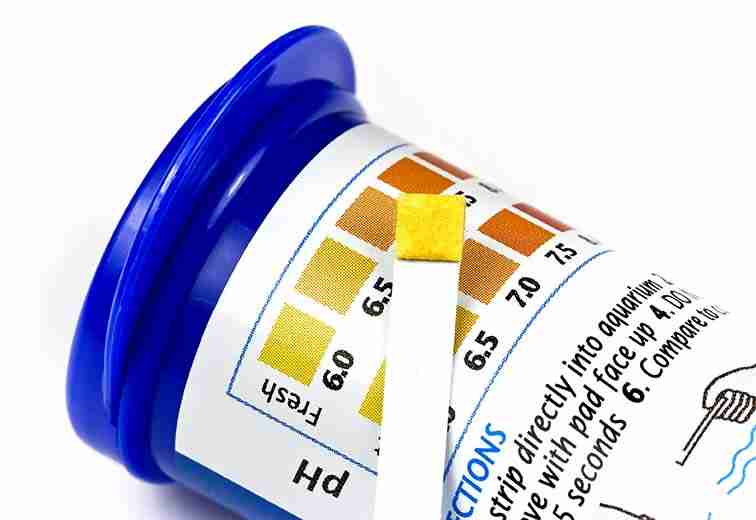
Water temperatures are important, but the other aquarium water parameters will also need to be checked because spikes in ammonia and nitrates can cause fish to feel unwell and lethargic, and so can sudden changes to the fish tank pH level.
Recommended Product
If you don’t already have them, testing strips are essential in keeping on top of your aquarium’s water parameters. Test strips will indicate several parameters such as ammonia, nitrates, nitrites, pH, calcium, chlorine, etc. They are available to buy in all good pet stores and online.
Find The Best Price At Amazon Or Chewy On Water Parameter Test Strips.
Does your aquarium water look dirty? A simple water change may help make your betta feel better if you have dirty water.
Frequent water changes are good, but don’t change your tank water too often, and don’t remove too much of the water, as you will remove much of the beneficial bacteria, which help to break down waste and remove ammonia from your tank. Also, make sure to add a water conditioner when carrying out a water change to avoid chemicals such as chlorine from entering the tank.
It would be best to always keep your betta tank similar to a betta’s natural environment, where it will feel most relaxed. You can add live plants, ornaments, and the correct substrates, such as gravel, sand, or clay.
Is the external environment stress-free? Betta fish can hear noises outside their tank, causing them to feel frightened or stressed. Ideally, you should plan out where to locate your betta’s tank, considering the overall level of noise they will be exposed to. Keep away from music and television speakers where possible.
Betta fish get bored in a tank with nothing to stimulate them, so why not add a few toys to keep your betta entertained and happy?
Many betta owners notice their betta forming a bubble nest when their betta fish are happy in their environment. A bubble nest is where a betta will blow bubbles at the surface that form a nest of bubbles. This is a natural breeding behavior and is usually found in male betta fish, who, in the wild, will make their nest under leaves while waiting for a female betta.
Bubble nests are a good sign of a healthy and relaxed betta fish, although it’s not necessarily bad if your betta does not make one. Not all bettas exhibit this behavior outside of mating season.
How long can a betta go without eating?
Betta fish are pretty resilient, and a healthy betta fish can go without eating for 10 to 14 days without any ill effects, but the reason your betta fish is not eating may bring complications.
Illness or disease complications can kill a betta fish long before a lack of eating takes its toll, so if your betta appears to be generally unwell, act quickly to diagnose and treat the cause.
As mentioned in a previous section, the aquarium temperature can impact how long a betta fish can go without eating. A betta fish in cold water will survive longer without food than in an adequately heated tank due to their metabolism slowing. Cold water causes slower consumption of calories, so fish need less food.
Conclusion
It can be hard to tell why your betta fish is not eating. You may notice that your betta stops eating when introduced to a new tank mate. In this case, stress is probably the reason.
If you have recently changed your betta’s diet, they may not like their new food. If you have already considered the most obvious causes without success, your betta may be unwell, so look out for other symptoms of illness.
Betta fishes do stop eating from time to time, and there isn’t one single cause. Hopefully, my list of possible reasons why your betta is not eating will help you narrow it down, discover why, and resolve it.


